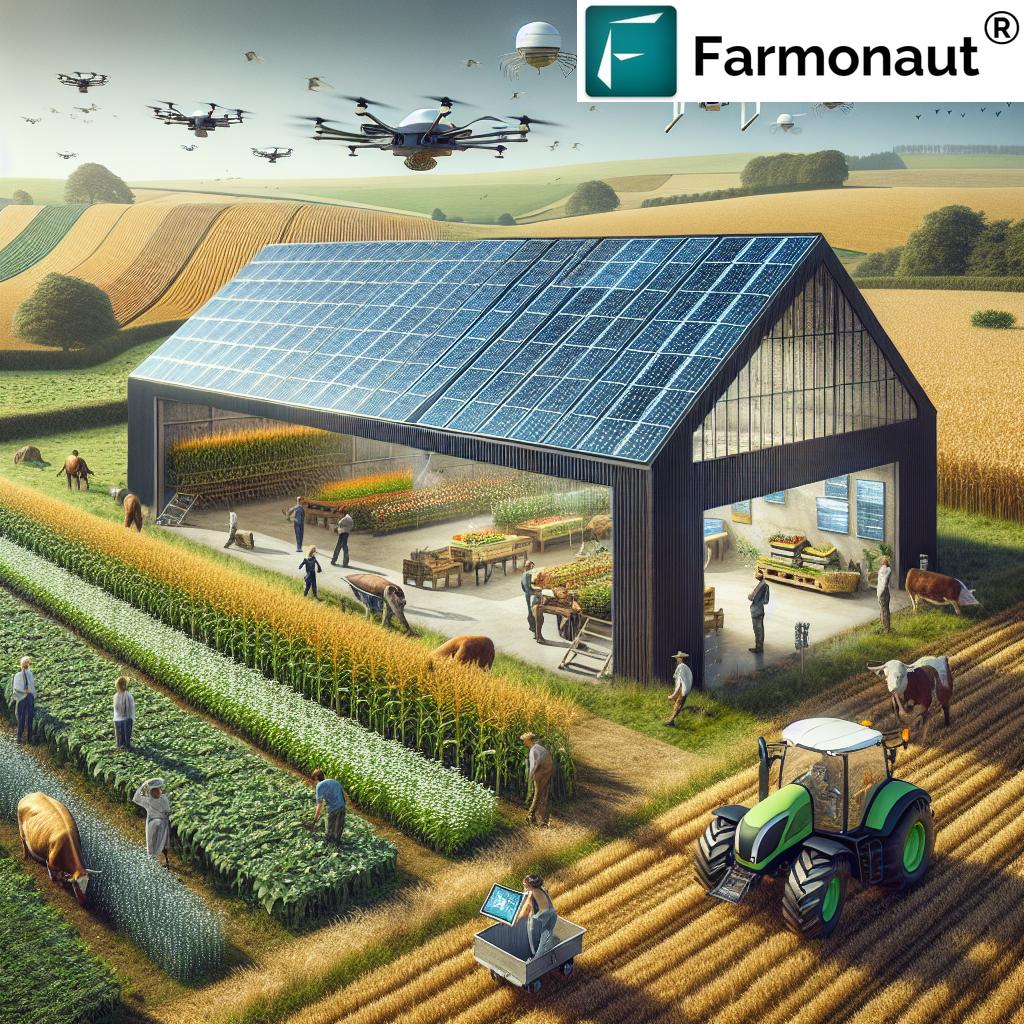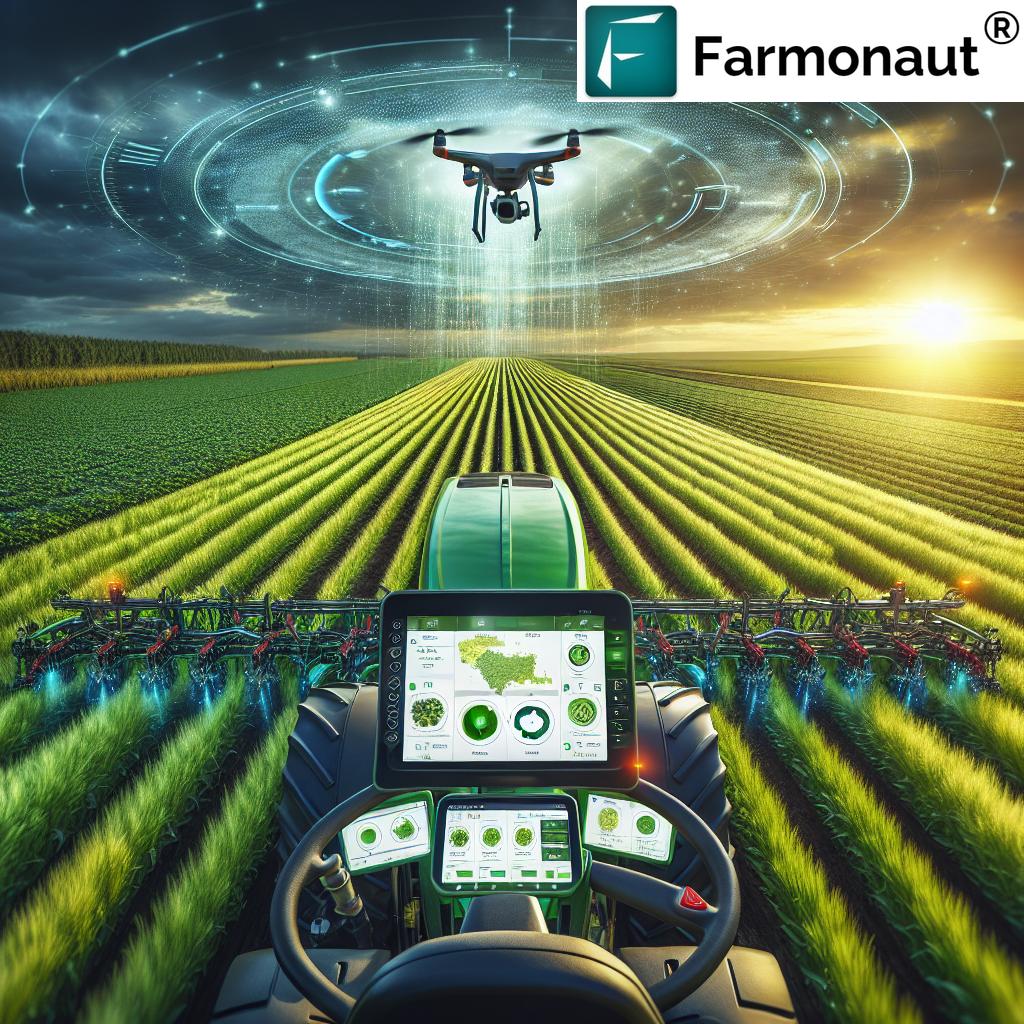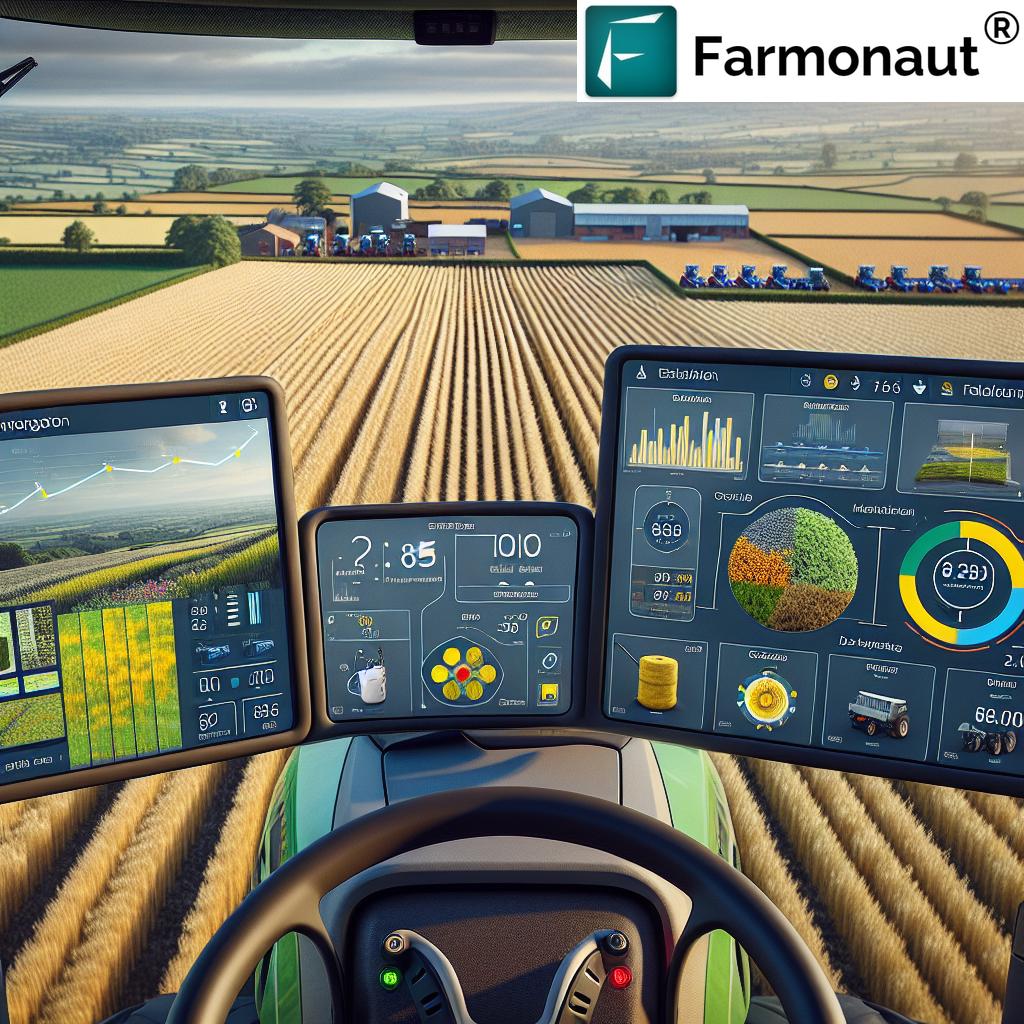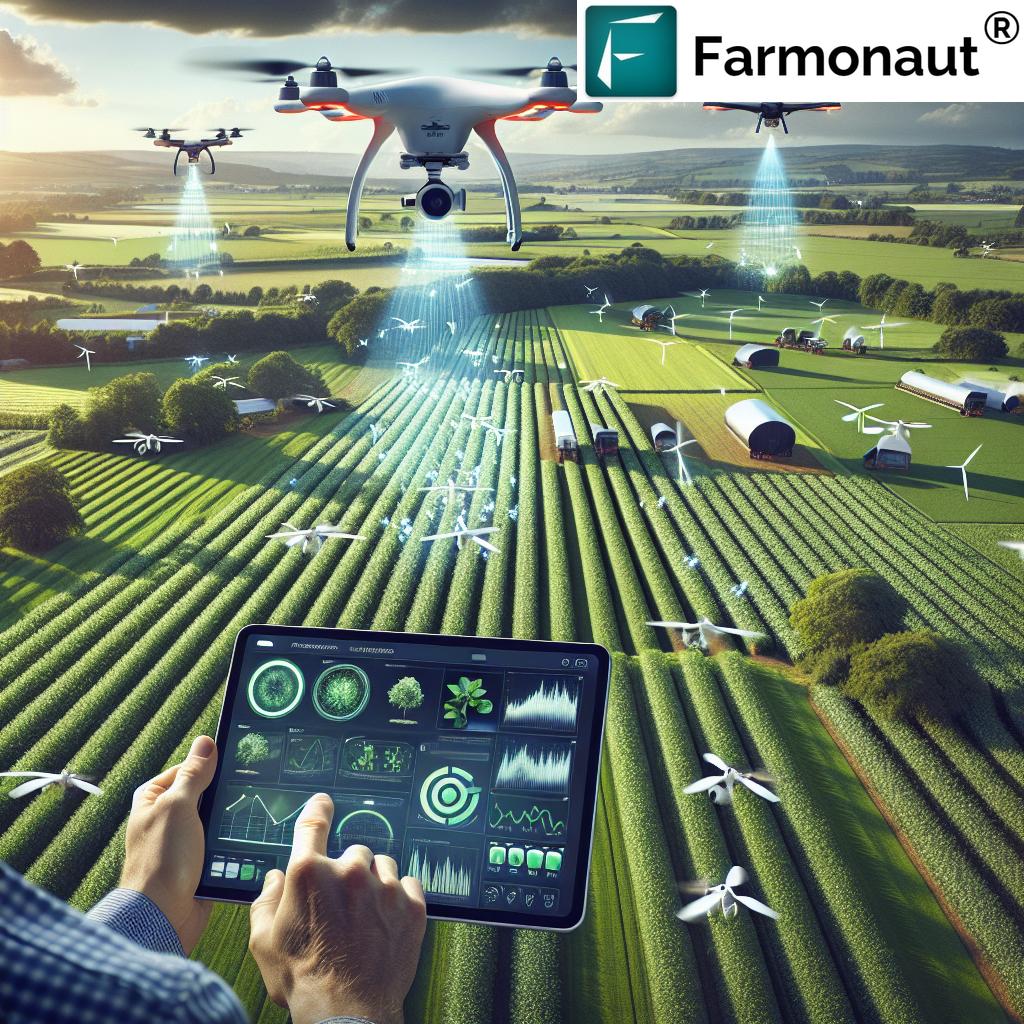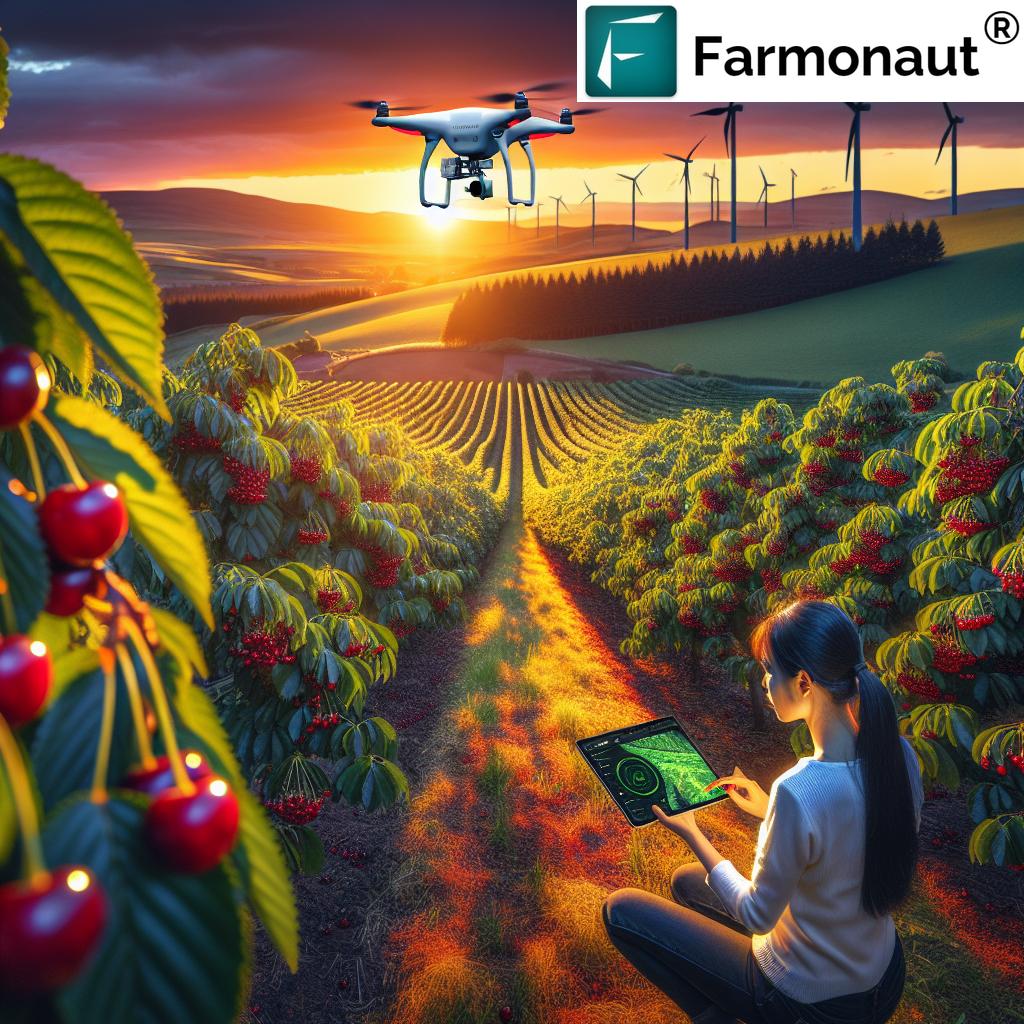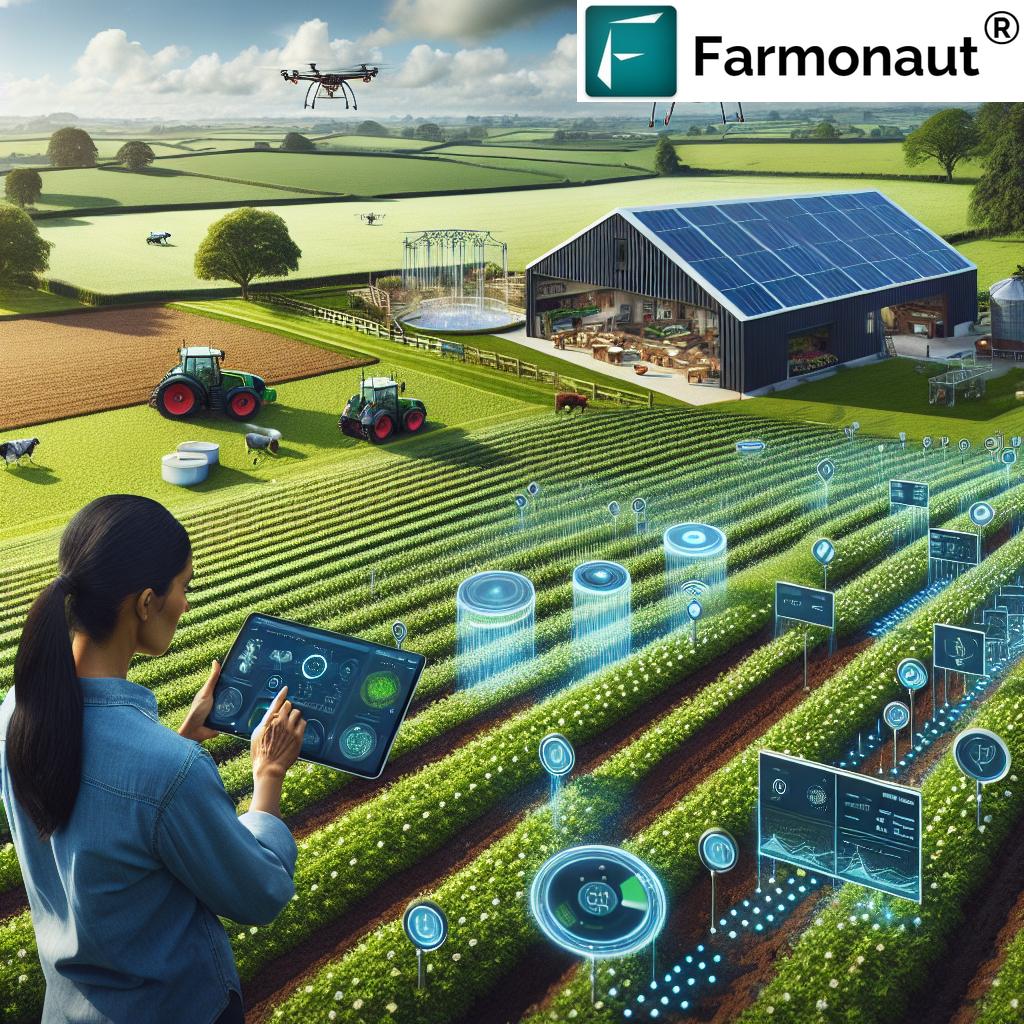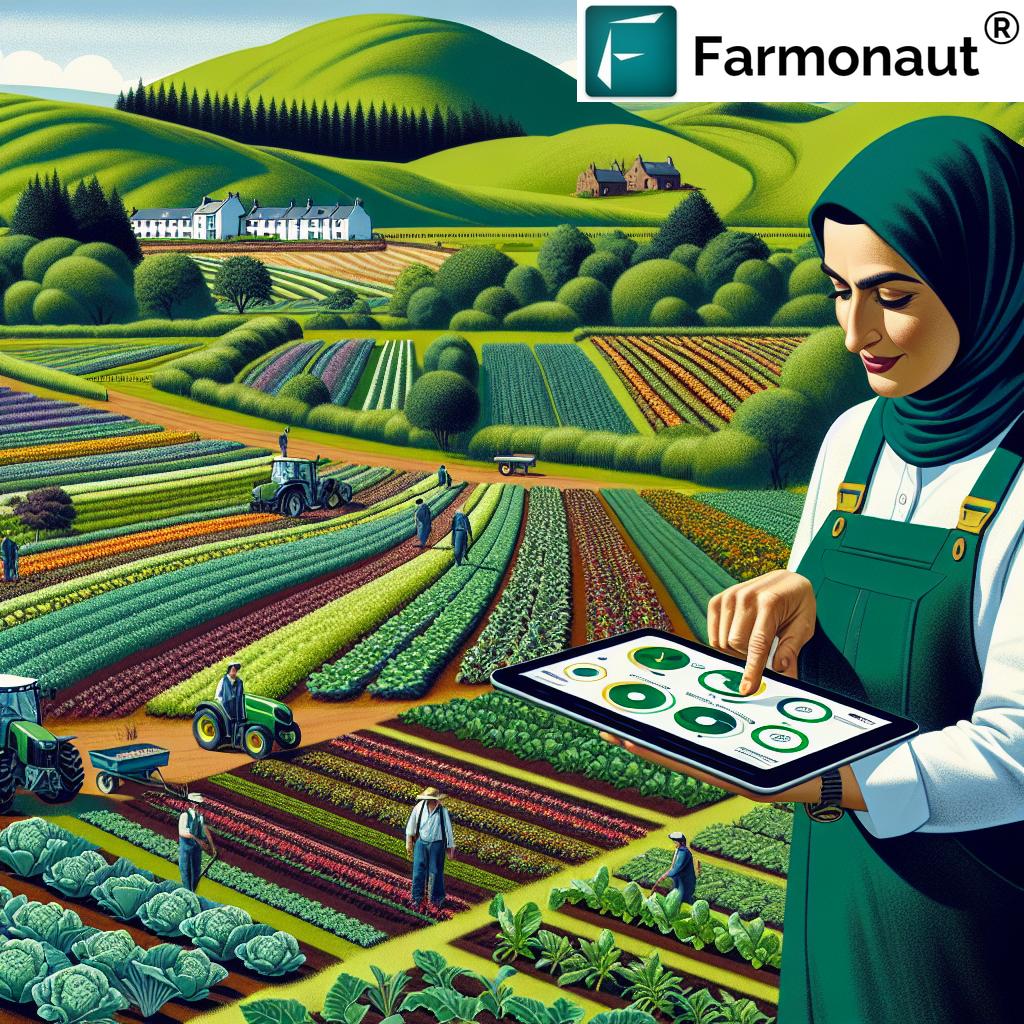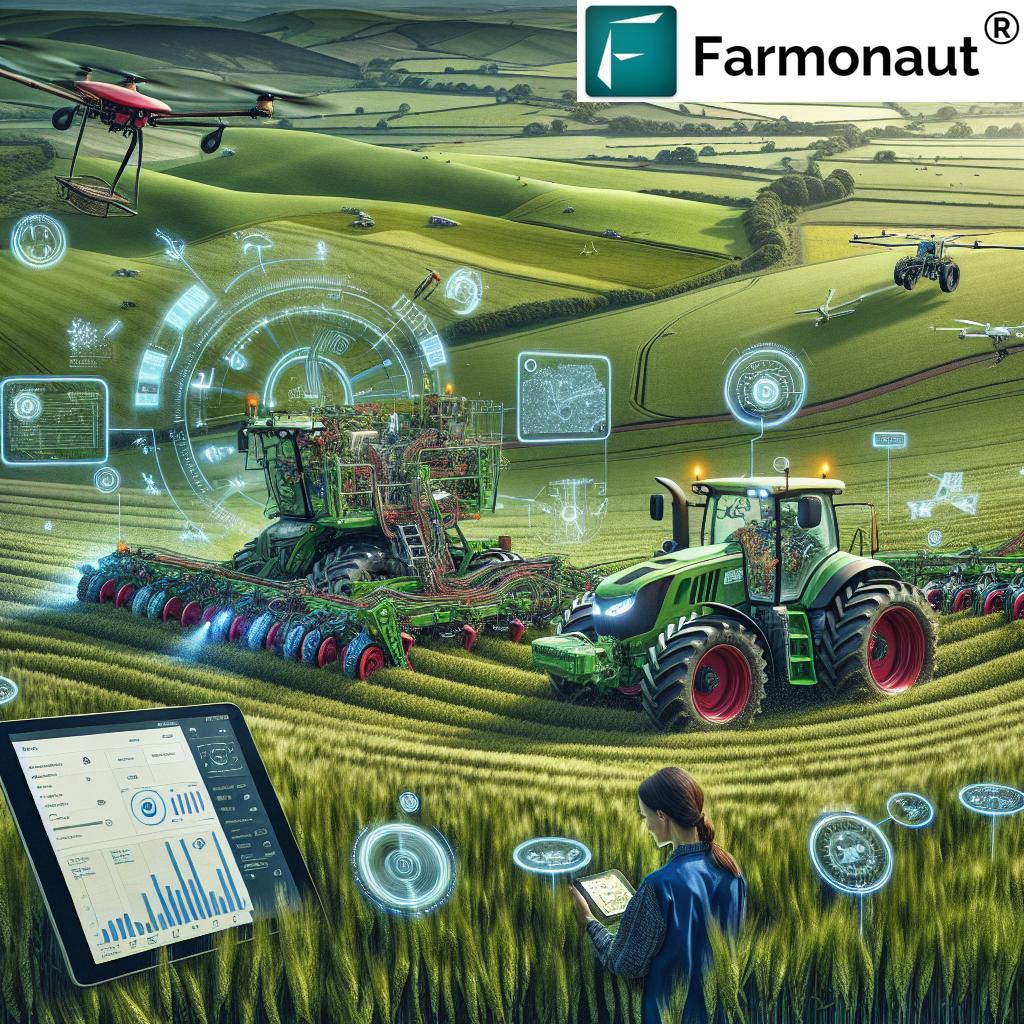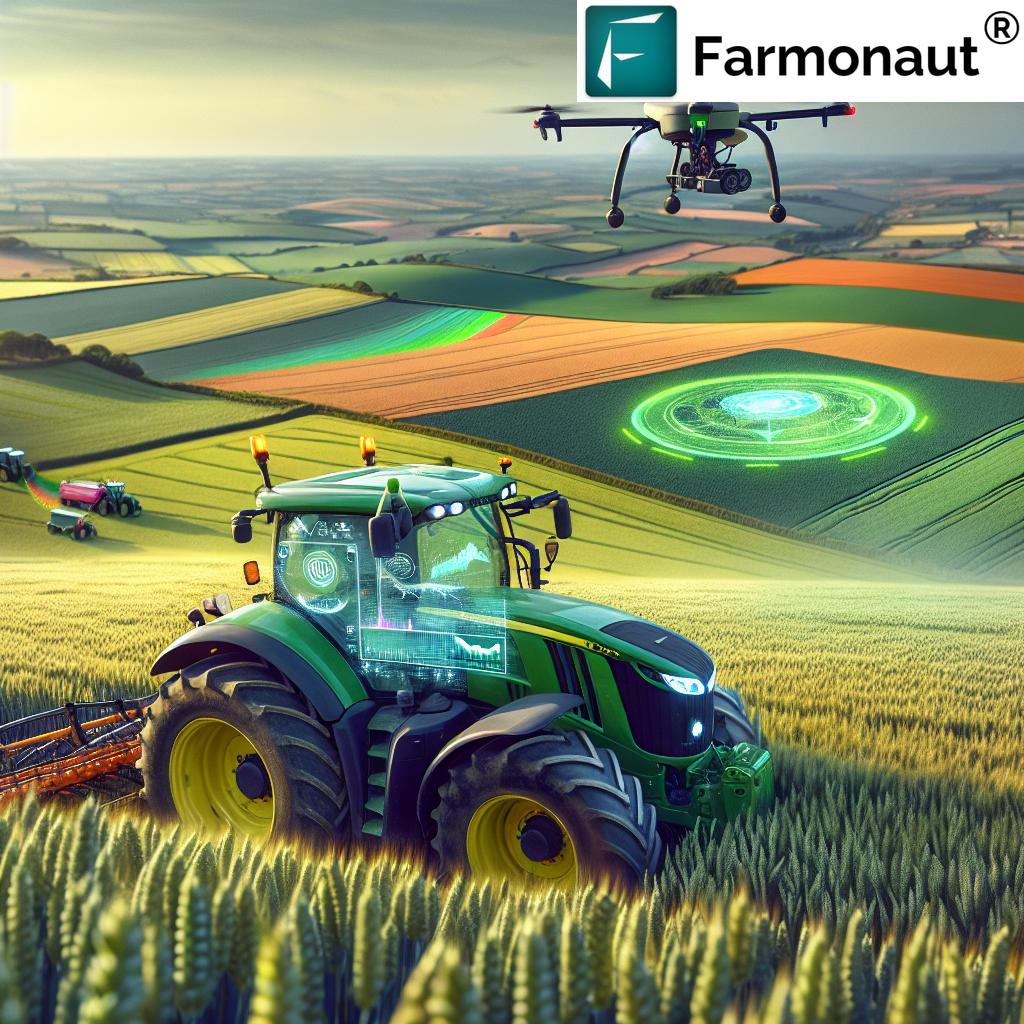Farmonaut’s Guide: UK Poultry Trends, Free-Range Egg Farming, and Avian Influenza Prevention Strategies
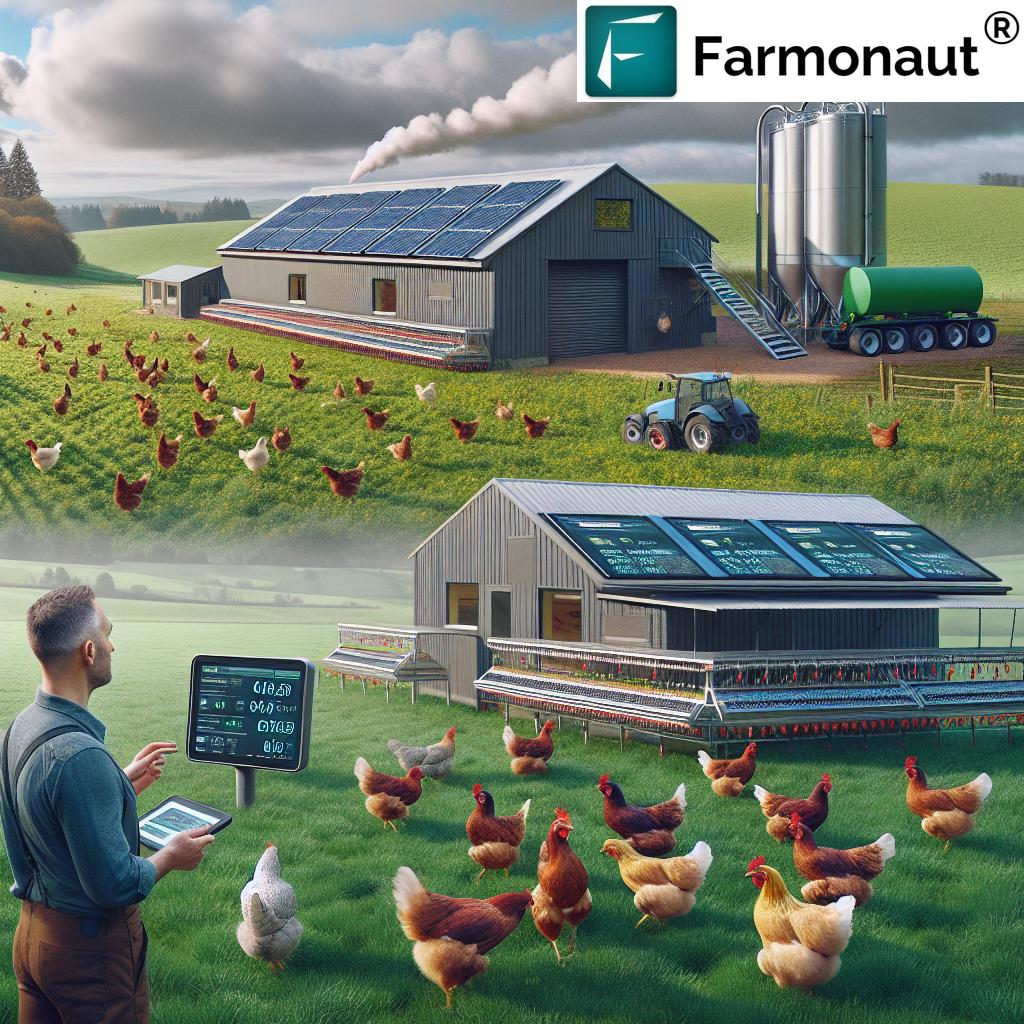
“UK free-range egg farms face dual challenges: 60% of flocks affected by avian influenza in 2022 and a 27% rise in feed costs.”
Welcome to Farmonaut’s comprehensive guide on UK poultry trends, free-range egg farming, and avian influenza prevention strategies. As leading experts in agricultural technology, we’re committed to providing farmers with the latest insights and tools to navigate the complex world of modern agriculture. In this blog post, we’ll delve into the current state of the UK poultry industry, focusing on free-range egg farming, market dynamics, and crucial health management strategies.
The State of UK Poultry: An Overview
The UK poultry industry is a vital component of the nation’s agricultural sector, contributing significantly to the economy and food security. Free-range egg farming, in particular, has gained prominence in recent years due to increasing consumer demand for ethically produced food. However, the industry faces numerous challenges, from disease outbreaks to fluctuating market conditions.
- Economic Impact: The poultry sector contributes over £3 billion annually to the UK economy.
- Production Scale: Approximately 11 billion eggs are produced yearly from 38 million laying hens.
- Consumer Trends: There’s a growing preference for free-range and organic eggs among UK consumers.
At Farmonaut, we recognize the importance of staying informed about these industry dynamics. Our satellite-based farm management solutions are designed to help poultry farmers adapt to changing market conditions and optimize their operations.
Free-Range Egg Farming: Trends and Challenges
Free-range egg farming has become increasingly popular in the UK, driven by consumer demand for higher welfare standards and more natural production methods. This shift presents both opportunities and challenges for farmers.
Key Trends in Free-Range Egg Farming
- Increased Market Share: Free-range eggs now account for a significant portion of UK egg sales.
- Premium Pricing: Consumers are willing to pay more for free-range eggs, offering potential for higher profits.
- Technological Integration: Adoption of smart farming techniques to improve efficiency and animal welfare.
Our Jeevn AI Advisory System at Farmonaut can provide valuable insights for free-range egg farmers, helping them optimize their operations and meet the growing demand for ethically produced eggs.
Challenges Facing Free-Range Egg Farmers
- Disease Risk: Outdoor access increases the risk of avian influenza and other diseases.
- Weather Vulnerability: Free-range systems are more susceptible to extreme weather conditions.
- Higher Production Costs: Maintaining free-range systems often requires more resources and labor.
To address these challenges, we offer satellite-based crop health monitoring and weather forecasting tools that can help farmers make informed decisions about flock management and resource allocation.
Market Dynamics: Understanding Egg Pricing and Demand
The UK egg market is characterized by fluctuating prices and changing consumer preferences. Understanding these dynamics is crucial for farmers to remain competitive and profitable.
Factors Influencing Egg Prices
- Seasonal Demand: Egg consumption tends to increase during certain periods, such as Easter and Christmas.
- Production Costs: Feed prices, energy costs, and labor expenses all impact the final egg price.
- Supply and Demand Balance: Overproduction can lead to price drops, while shortages can cause price spikes.
At Farmonaut, we provide real-time market data and analytics to help farmers make informed decisions about production levels and pricing strategies.
Consumer Preferences and Market Trends
- Ethical Considerations: Growing concern for animal welfare is driving demand for free-range and organic eggs.
- Health Consciousness: Eggs are increasingly recognized as a nutritious food source, boosting overall demand.
- Transparency: Consumers are seeking more information about egg production methods and farm practices.
Our blockchain-based traceability solutions can help egg producers meet this demand for transparency, providing consumers with verifiable information about egg origins and production methods.
“The UK poultry industry contributes £3.3 billion annually to the economy, with 11 billion eggs produced yearly from 38 million laying hens.”
Avian Influenza: Prevention and Management Strategies
Avian influenza, particularly the highly pathogenic H7N7 strain, poses a significant threat to the UK poultry industry. Effective prevention and management strategies are crucial for protecting flocks and maintaining production.
Understanding Avian Influenza
- Transmission: The virus can spread through direct contact with infected birds or contaminated environments.
- Symptoms: Include respiratory distress, decreased egg production, and high mortality rates.
- Economic Impact: Outbreaks can result in substantial financial losses due to culling and trade restrictions.
Our satellite-based monitoring systems can help detect early signs of disease outbreaks by identifying unusual patterns in flock behavior or crop health.
Prevention Strategies
- Biosecurity Measures: Implementing strict hygiene protocols and limiting farm access.
- Vaccination Programs: Where approved, vaccinations can provide additional protection against certain strains.
- Environmental Management: Proper ventilation and waste management to reduce disease risk.
Farmonaut’s fleet and resource management tools can assist in implementing and maintaining these crucial prevention strategies across poultry farms.
Sustainable Poultry Practices: Balancing Production and Environmental Responsibility
Sustainability is becoming increasingly important in the poultry industry, with farmers seeking ways to reduce their environmental impact while maintaining productivity.
Key Aspects of Sustainable Poultry Farming
- Resource Efficiency: Optimizing feed, water, and energy use to reduce waste and costs.
- Waste Management: Implementing proper manure handling and composting techniques.
- Carbon Footprint Reduction: Adopting practices to minimize greenhouse gas emissions.
At Farmonaut, we offer carbon footprinting tools that allow poultry farmers to track and reduce their environmental impact, supporting sustainable farming practices.
Innovative Approaches to Sustainability
- Renewable Energy: Integrating solar or wind power into farm operations.
- Precision Feeding: Using data-driven approaches to optimize nutrition and reduce feed waste.
- Circular Economy Principles: Finding new uses for byproducts and waste materials.
Our AI-powered advisory system can provide tailored recommendations for implementing these sustainable practices on individual farms.
Egg Production Management: Optimizing Efficiency and Quality
Effective egg production management is crucial for maintaining profitability and meeting market demands. This involves careful attention to flock health, nutrition, and environmental conditions.
Key Factors in Egg Production Management
- Flock Health: Regular monitoring and prompt treatment of health issues.
- Nutrition: Balanced feed formulation to support egg production and shell quality.
- Light Management: Optimizing light exposure to regulate laying cycles.
- Temperature Control: Maintaining optimal environmental conditions for laying hens.
Farmonaut’s satellite-based monitoring systems can provide valuable data on environmental conditions, helping farmers optimize their egg production management strategies.
Technology in Egg Production
- Automated Collection Systems: Reducing labor costs and minimizing egg damage.
- Data Analytics: Using big data to identify trends and optimize production.
- IoT Sensors: Monitoring environmental conditions and flock behavior in real-time.
Our comprehensive farm management platform integrates these technologies, providing farmers with a powerful tool for improving egg production efficiency.
Animal Welfare in Agriculture: Meeting Standards and Consumer Expectations
Animal welfare is a growing concern in the poultry industry, with consumers and regulators demanding higher standards of care for laying hens.
Key Aspects of Animal Welfare in Poultry Farming
- Housing Systems: Providing appropriate space and enrichment for natural behaviors.
- Health Management: Implementing preventive health measures and prompt treatment of illnesses.
- Stress Reduction: Minimizing stressors through proper handling and environmental management.
Farmonaut’s AI-powered advisory system can help farmers implement and maintain high animal welfare standards, ensuring compliance with regulations and meeting consumer expectations.
Balancing Welfare and Productivity
- Genetic Selection: Breeding for both productivity and robustness.
- Nutrition Optimization: Formulating diets that support both health and egg production.
- Technology Integration: Using monitoring systems to quickly identify and address welfare issues.
Our satellite-based monitoring and data analytics tools can provide valuable insights into flock behavior and health, supporting farmers in their efforts to balance welfare and productivity.
Agricultural Market Analysis: Navigating the Poultry Industry Landscape
Understanding market trends and conducting thorough agricultural market analysis is essential for poultry farmers to make informed decisions and remain competitive.
Key Components of Poultry Market Analysis
- Supply and Demand Forecasting: Predicting market needs to adjust production accordingly.
- Price Trend Analysis: Monitoring egg and input price trends to optimize profitability.
- Consumer Behavior Studies: Understanding changing preferences and purchasing patterns.
- Competitive Landscape Assessment: Analyzing competitors’ strategies and market positioning.
At Farmonaut, we provide comprehensive market analysis tools that integrate with our satellite data and AI advisory systems, offering farmers a complete picture of the industry landscape.
Leveraging Data for Market Insights
- Big Data Analytics: Utilizing large datasets to identify patterns and trends.
- Real-Time Monitoring: Tracking market changes as they happen for quick decision-making.
- Predictive Modeling: Using AI to forecast future market conditions and opportunities.
Our advanced analytics platform combines these approaches, providing poultry farmers with actionable insights to navigate the complex market landscape.
Poultry Health Monitoring: Ensuring Flock Wellbeing and Productivity
Effective health monitoring is crucial for maintaining productive and healthy poultry flocks. Early detection of health issues can prevent widespread disease outbreaks and ensure optimal egg production.
Key Aspects of Poultry Health Monitoring
- Regular Health Checks: Implementing routine physical examinations and health assessments.
- Disease Surveillance: Monitoring for signs of common poultry diseases and emerging threats.
- Performance Tracking: Analyzing egg production rates and quality as indicators of flock health.
- Environmental Monitoring: Assessing air quality, temperature, and humidity levels in poultry houses.
Farmonaut’s satellite-based monitoring systems can complement on-ground health monitoring efforts, providing additional data on environmental conditions that may impact flock health.
Innovative Technologies in Poultry Health Monitoring
- Wearable Sensors: Tracking individual bird health metrics and behavior patterns.
- Automated Vision Systems: Using cameras and AI to detect abnormal behavior or physical symptoms.
- Predictive Health Analytics: Utilizing big data to forecast potential health issues before they occur.
Our AI-powered advisory system integrates these technologies, offering farmers comprehensive health monitoring solutions that can significantly improve flock management and disease prevention.
Agritech Solutions for Poultry Farmers: Embracing Innovation
The integration of agricultural technology (agritech) solutions is revolutionizing the poultry industry, offering farmers new tools to improve efficiency, productivity, and sustainability.
Key Agritech Solutions for Poultry Farming
- Precision Feeding Systems: Optimizing nutrition delivery based on flock needs and market demands.
- Climate Control Technology: Maintaining optimal environmental conditions for poultry health and productivity.
- Automated Egg Collection and Grading: Reducing labor costs and improving egg quality management.
- Farm Management Software: Integrating various aspects of farm operations for better decision-making.
At Farmonaut, we offer a range of agritech solutions tailored to the needs of poultry farmers, from satellite-based monitoring to AI-powered advisory systems.
Emerging Technologies in Poultry Farming
- Blockchain for Traceability: Ensuring transparency in the egg supply chain.
- Robotics: Automating routine tasks to improve efficiency and reduce labor costs.
- Virtual and Augmented Reality: Enhancing training and remote farm management capabilities.
Our commitment to innovation drives us to continuously explore and integrate these emerging technologies into our platform, providing poultry farmers with cutting-edge tools to stay ahead in a competitive market.
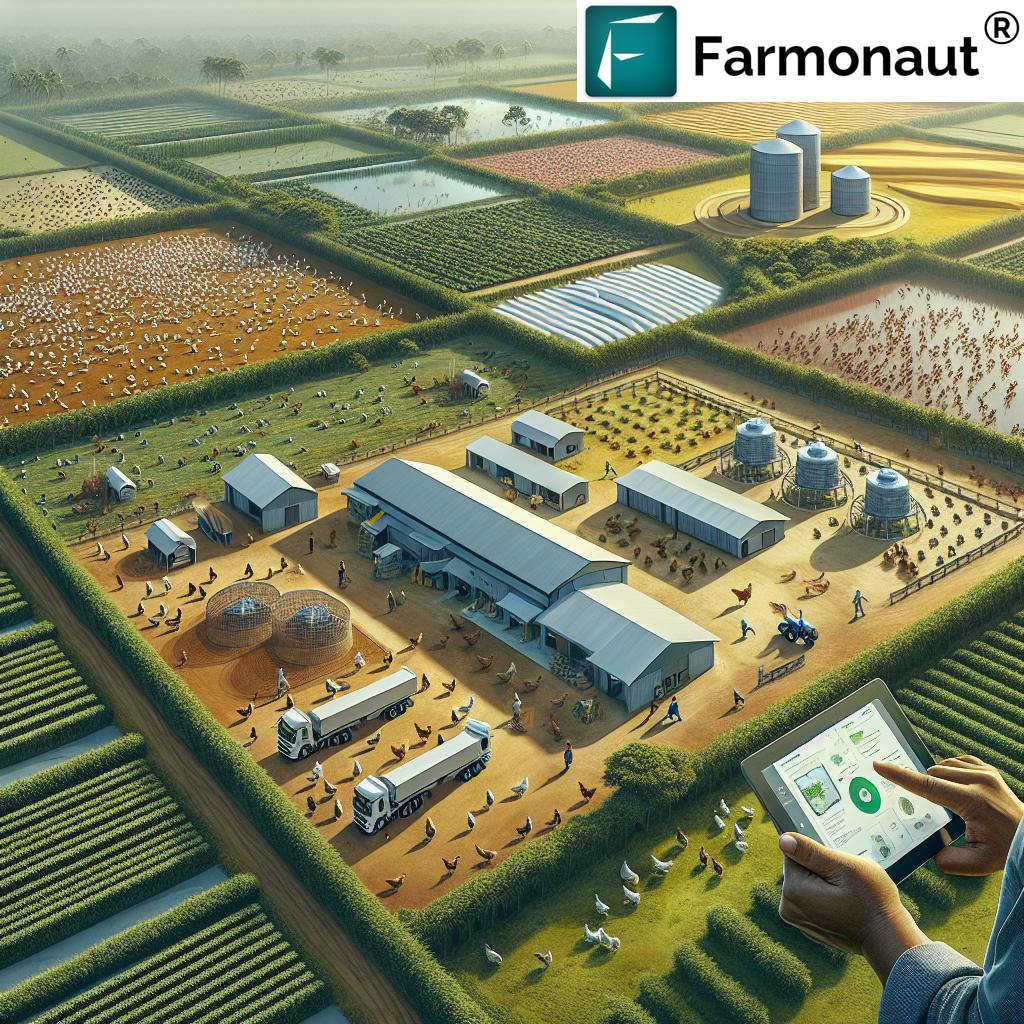
UK Poultry Industry Trends and Challenges: A Comprehensive Overview
| Trend/Challenge | Description | Impact | Potential Solutions |
|---|---|---|---|
| Avian Influenza Outbreaks | Recurring outbreaks of highly pathogenic avian influenza strains | Significant economic losses, trade restrictions, and flock culling | Enhanced biosecurity measures, improved surveillance systems, and vaccination programs where permitted |
| Consumer Demand for Free-Range Eggs | Increasing preference for eggs from free-range systems | Shift in production methods, potential for higher profits, but increased production costs | Investment in free-range facilities, marketing strategies highlighting welfare standards |
| Government Regulations on Animal Welfare | Stricter regulations on housing, feed, and care standards | Need for farm upgrades, potential increase in production costs | Adoption of advanced monitoring technologies, staff training on welfare practices |
| Seasonal Fluctuations in Egg Prices | Price variations due to seasonal demand changes | Inconsistent revenue streams, challenges in financial planning | Diversification of product offerings, long-term contracts with buyers, improved storage solutions |
| Adoption of Agritech Solutions | Integration of advanced technologies in farm management | Improved efficiency and productivity, initial investment costs | Phased implementation of technologies, staff training, partnerships with agritech providers |
Frequently Asked Questions (FAQ)
Q1: What are the main challenges facing free-range egg farmers in the UK?
A1: Free-range egg farmers in the UK face several challenges, including:
- Higher risk of avian influenza outbreaks due to outdoor access
- Increased production costs compared to cage systems
- Fluctuating market prices and seasonal demand
- Stricter animal welfare regulations
- Weather-related risks affecting outdoor areas
Q2: How can technology help in preventing and managing avian influenza outbreaks?
A2: Technology can play a crucial role in avian influenza prevention and management through:
- Early detection systems using AI and machine learning
- Real-time monitoring of flock health and behavior
- Automated biosecurity systems for farm access control
- Data analytics for identifying risk factors and predicting outbreaks
- Remote monitoring capabilities for quick response to potential threats
Q3: What are the key factors influencing egg prices in the UK market?
A3: Egg prices in the UK are influenced by several factors:
- Supply and demand balance
- Seasonal variations in consumption
- Production costs, including feed and energy prices
- Consumer preferences for different egg types (e.g., free-range, organic)
- Trade policies and import/export dynamics
- Disease outbreaks affecting supply
Q4: How can poultry farmers improve the sustainability of their operations?
A4: Poultry farmers can enhance sustainability through:
- Implementing efficient resource management systems
- Adopting renewable energy sources like solar or wind power
- Optimizing feed formulations to reduce waste and environmental impact
- Improving waste management and composting practices
- Using precision farming techniques to minimize resource use
- Investing in energy-efficient equipment and buildings
Q5: What role does blockchain technology play in the poultry industry?
A5: Blockchain technology offers several benefits to the poultry industry:
- Enhanced traceability of eggs and poultry products
- Improved transparency in the supply chain
- Verification of product origins and production methods
- Faster and more efficient recall processes in case of safety issues
- Building consumer trust through verifiable information
Conclusion: Embracing Innovation for a Thriving Poultry Industry
As we’ve explored throughout this comprehensive guide, the UK poultry industry, particularly the free-range egg sector, faces both exciting opportunities and significant challenges. From navigating market dynamics and consumer preferences to addressing health concerns like avian influenza, farmers must stay informed and adaptable.
At Farmonaut, we’re committed to supporting poultry farmers with cutting-edge technology and data-driven insights. Our satellite-based monitoring systems, AI-powered advisory tools, and blockchain solutions offer a comprehensive approach to modern farm management. By embracing these innovations, farmers can enhance productivity, ensure animal welfare, and meet the growing demand for sustainably produced eggs.
The future of poultry farming lies in the integration of traditional knowledge with advanced technology. By staying informed about industry trends, implementing sustainable practices, and leveraging agritech solutions, UK poultry farmers can position themselves for long-term success in this dynamic and essential industry.
We invite you to explore how Farmonaut’s solutions can help you navigate the complexities of modern poultry farming. Together, we can build a more resilient, efficient, and sustainable future for the UK poultry industry.
Ready to revolutionize your poultry farm with cutting-edge technology? Explore Farmonaut’s solutions today:
For developers interested in integrating our powerful agricultural data into their own applications, check out our API and API Developer Docs.






